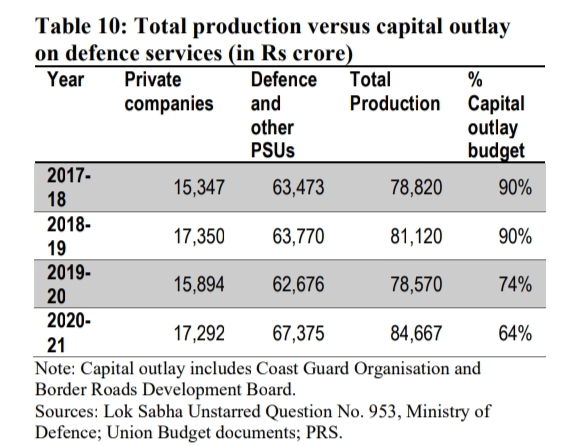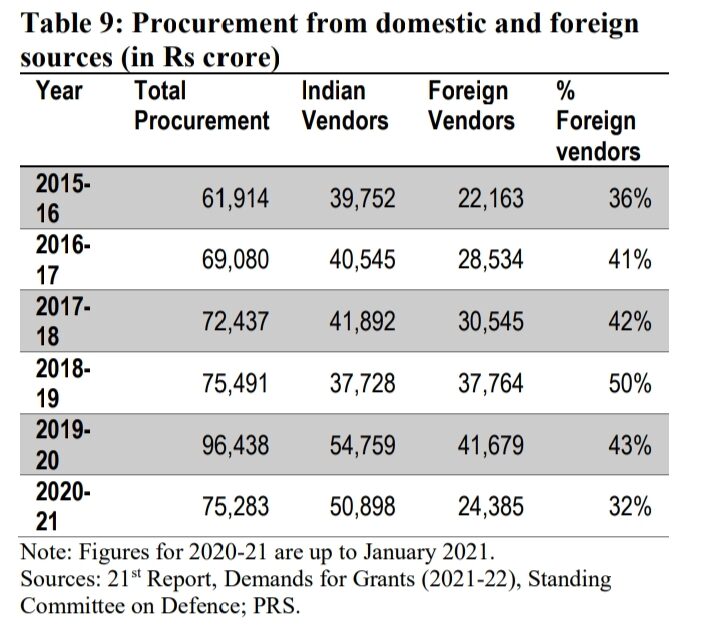Atmanirbharta in defence seems to be attainable more than ever as India over achieves its target of utilizing 64% of defence capital acquisition budget on Indigenous procurements. “At the end of FY 2021-22, the MoD has been able to overachieve this target and has utilised 65.50 per cent of the Capital Acquisition Budget on indigenous procurements through Indian Industry to achieve Prime Minister Narendra Modi’s vision of ‘Aatmanirbhar Bharat’,” the defence Ministry said in a press release confirming the feat.
Defence procurement refers to the acquisition of defence equipment, systems and platforms which is undertaken by the Ministry of defence, for the three armed forces. In order to promote indigenisation and domestic production of defence equipment, the government has notified 209 items which will be exclusively procured from indigenous sources (domestic vendors).
In 2021, nearly Rs 1, 35,060 crores was allocated as capital budget to procure weapons and other military systems. In order to promote Indian industry, 64 per cent of this capital budget was reserved for domestic players. However, India overachieved the aspired target.
Subhash Bhamre, member of parliament and the former Minister of state for Defence (2016-2019) tells The Voices that Indigenization as a collective effort was expedited by PM Modi, former defence Minister Manohar Parrikar and him. He says,“All these years, India has been the largest importer of defence equipment and platform which was also hindering India’s prosperity and economy. That’s why it was decided to support indigenous production in defence supplies. This encouraged government to consider procurement of defence instruments, platforms from Indian vendors. Department of Defence Production, Ministry of Defence has 41 ordnance factories and 56 Central Public Sector Undertakings (CPSUs) under its administrative control. Inspite of that the imports from foreign vendors were high. It was then when PM asserted to resort to domestic capabilities and talent in defence manufacturing.” Bhamre also tells that a level playing ground was established between Public and private players by policy incentives to promote competition and augment quality.
In order to project India as a hub of defence manufacturing on global level, the government has earmarked 68 per cent of the capital budget of financial year 2022-23. 25% of Domestic Capital Procurement and Acquisition Budget, i.e Rs. 21,149.47 Crore, has been reserved for Domestic Private Industry in the Financial Year 2022-23. An amount of Rs. 1,500 Crore has been issued for procurement from start-ups, including iDEX Start-up, from within the allocations for Domestic Capital Procurement.

Bhamre confirmed that initial calling for foreign collaborations in domestic defence manufacturing will eventually be succeeded by Transfer of Technology (ToT) which will further strengthen the exportability prospects for the domestic defense manufacturing sector.
Between 2015-16 and 2018-19, the percentage of defence equipment acquired from foreign vendors increased to up to 50%. In the first six months of 2021-22, the armed forces had spent Rs 62,975 crore on procurement of defence equipment out of which only 34% of the amount was spent on foreign vendors, which confirms significant reduction in import.

Experts believe that the long-term impact of such policy wont only inspire self-sufficiency for domestic security aspirations but would also enhance the export potential of domestic defence sector. “India may become a donor of defence equipment to several countries”, tells Vijay Khare, faculty, – National Centre of International Security and Defense Analysis, Pune University.
On 26 March 2022, Defence Minsiter Rajnath Singh confirmed that the defence export has risen from 1941 crore in 2015 to 11607 crore in 2021-22, which shows 6 times growth. In January 20222 India successfully signed the export contract for BrahMos supersonic cruise missile to Philippines. Vietnam, Indonesia and other ASEAN countries are in talks for defence procurement from India. The Ministry of Defence has set a target of achieving a turnover of Rs 1.75 lakh crore by 2024 for indigenous manufacturing and Rs 35,000 crore for exports.
Edited by NK Jha

